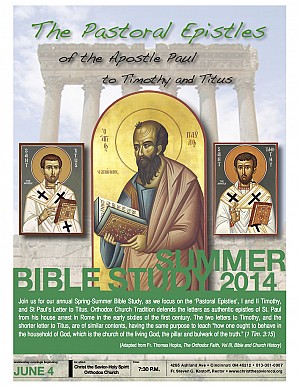Dear Parish Faithful,
CHRIST IS RISEN!
The Pastoral Epistles
Announcing this year's Spring-Summer Bible Study! All of the necessary information can be found on the wonderful attached flier. As always, this promises to be a spiritually-stimulating and "exciting" event. It is after all the living Word of God! So, put off Netflix for an evening and nourish your souls with the teaching of the Apostle Paul and his words of encouragement and wisdom for us today living within a Christian community.
The Bible Study will begin on Wednesday, June 4, meeting after the Vespers service that will begin at 7:00 p.m.
I will also offer to repeat the Bible Study on Thursday mornings at 10:00 a.m. for those who cannot come on Wednesday evenings. For this group, I will require six persons to make a commitment. Please contact me if you are interested.
-- Fr Steven
2014 Summer Bible Study Flier (PDF)
Scroll down for an introduction to the Letters to Timothy and Titus...
THE PASTORAL EPISTLES
of the Apostle Paul to Timothy and Titus
by Fr Thomas Hopko
The Orthodox Faith, Vol. III, Bible and Church History
Timothy
The letters of St. Paul to Timothy and Titus are called the pastoral epistles. Although some modern scholars consider these letters as documents of the early second century, primarily because of the developed picture of Church structure which they present, Orthodox Church Tradition defends the letters as authentic epistles of St. Paul from his house arrest in Rome in the early sixties of the first century.
"The Church of the Living God [is] the pillar and bulwark of the truth." (1 Timothy 3:15)
The two letters to Timothy are of similar contents, having the same purpose to teach “how one ought to behave in the household of God, which is the church of the living God, the pillar and bulwark of the truth.” (1 Timothy 3:15)
In his first letter to Timothy, St. Paul urges his “true child in the faith” (1:2), who was in Ephesus, to “wage the good warfare, holding faith and a good conscience.” (1:18-19) He urges that prayers “be made for all men” by the Church (2:1) and that “good doctrine” be preserved and propagated, most particularly in times of difficulties and defections from the true faith. (4:6, 6:3) In the letter, the apostle counsels all in proper Christian belief and behavior, giving special advice, both professional and personal, to his co-worker Timothy whom he counsels not to neglect the gift which he received “when the elders laid their hands” upon him. (4:14)
The main body of the first letter to Timothy describes in detail the requirements for the pastoral offices of bishop, deacon and presbyter (priest or elder), and offers special instructions concerning the widows and slaves. The rules concerning the pastoral ministries have remained in the Orthodox Church, being formally incorporated into its canonical regulations.
Of special note in the first letter to Timothy is St. Paul’s confession of sinfulness which has become part of the pre-communion prayers of the Orthodox Church.
"The saying is sure and worthy of full acceptance, that Christ Jesus came into the world to save sinners, of whom I am first." (1 Timothy 1:15)
In his second letter to Timothy, St. Paul again urges his “beloved child” to “rekindle the gift of God that is within you through the laying on of my hands.” (1:2,6) He stresses the absolute necessity for “sound doctrine” in the Church, calling for a firm struggle against “godless chatter” and the “disputing over words” (2:14,16) particularly in “times of stress” when the gospel is attacked by men of “corrupt mind and counterfeit faith” who are merely “holding the form of religion but denying the power of it.” (3:1-8) As in his first letter, the apostle specifically mentions the need for the firm adherence to the scriptures. (3:15)
The expression of St. Paul in this letter, that the leaders of the Church must be found “rightly handling the word of truth” (2:15), has become the formal liturgical prayer of the Orthodox Church for its bishops.
Titus
St. Paul’s letter to Titus in Crete is a shorter version of his two letters to Timothy. The author outlines the moral requirements of the bishop in the Church and urges the pastor always to “teach what befits sound doctrine.” (1:9, 2:1) It tells how both the leaders and the faithful members of the Church should behave.
"The grace of God that brings salvation has appeared to all men..." (Titus 2:11)
Sections of the letter to Titus about the appearance of “the grace of God ... for the salvation of all men ... by the washing of regeneration and renewal in the Holy Spirit which He poured out upon us richly through Jesus Christ our Savior” (2:11-3:7) comprise the Church’s epistle reading for the feast of the Epiphany.
Generally speaking, each of the pastoral epistles is included in the Church’s continual epistle lectionary, coming in the Church year just before the beginning of Great Lent.

